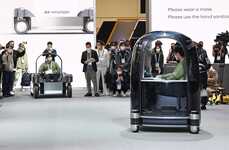
Hyundai's Active Shift Control Reduces Gear Shift Time for Hybids
Daniel Johnson — July 30, 2019 — Autos
References: hyundaicanada & carscoops
Hyundai has developed new technology for hybrid engines that will make them perform better, titled Active sHift Control. The Active Shift Control system improves gear shift times by 30% and also improves the engine fuel economy. The new technology will be set for mass production and incorporated into future Hyundai hybrid cars.
The new technology works by monitoring gear shifts at a rate of 500 times a second. The system also makes use of new software to the Hybrid Control Unit, this allows for shorter shift times and counteracts the hybrid engine not having torque converters. Active Shift Control will also help increase durability by decreasing the amount of friction that occurs from shifting gears.
The new technology will first be implemented on the new Hyundai Sonata Hybrid, then to other models, such as Kia hybrids.
The new technology works by monitoring gear shifts at a rate of 500 times a second. The system also makes use of new software to the Hybrid Control Unit, this allows for shorter shift times and counteracts the hybrid engine not having torque converters. Active Shift Control will also help increase durability by decreasing the amount of friction that occurs from shifting gears.
The new technology will first be implemented on the new Hyundai Sonata Hybrid, then to other models, such as Kia hybrids.
Trend Themes
1. Active Shift Control Technology - Hyundai's Active Shift Control technology improves gear shift times by 30% and increases engine fuel economy, presenting opportunities for other automakers to enhance the performance of their hybrid engines.
2. Real-time Gear Shift Monitoring - Hyundai's technology monitors gear shifts at a rate of 500 times a second, paving the way for advancements in real-time monitoring systems for hybrid engines.
3. Friction Reduction and Durability Enhancement - Hyundai's Active Shift Control technology reduces friction during gear shifts, leading to increased durability and fuel efficiency in hybrid engines, providing opportunities for advancements in engine design and performance.
Industry Implications
1. Automotive - The automotive industry can explore the implementation of Active Shift Control technology to optimize the performance of hybrid engines and improve fuel efficiency.
2. Software - The software industry can develop advanced software solutions for real-time monitoring and control of gear shifts in hybrid engines, enhancing the overall performance of hybrid vehicles.
3. Materials and Manufacturing - The materials and manufacturing industries can innovate in developing new and improved components and mechanisms that reduce friction during gear shifts, leading to enhanced durability and efficiency in hybrid engines.
3.2
Score
Popularity
Activity
Freshness























